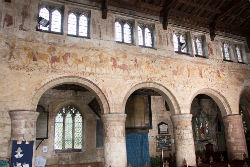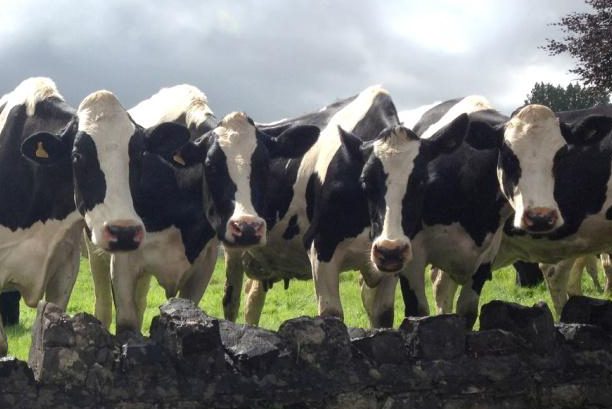OBE for physical activity champion in New Year Honours list
Dr Charlie Foster from the University of Bristol has been awarded an OBE in the Queen’s New Year Honours list, in recognition of his work to promote physical activity.
Dr Charlie Foster from the University of Bristol has been awarded an OBE in the Queen’s New Year Honours list, in recognition of his work to promote physical activity.
A scientist from the University of Bristol has been honoured in the Queen’s New Year Honours list, which recognises the achievements and service of people across the UK. Along with the Birthday honours, they are the most significant announcement of civilian and military gallantry awards.
Scientists have identified a growth factor found in the kidneys that could minimise the diabetes-inducing effects of blood vessel damage.
Earlier this year, the United Nations announced that the ozone layer, which shields the Earth from the sun’s harmful ultraviolet radiation, and which was severely depleted by decades of human-derived, ozone-destroying chemicals, is on the road to recovery.
Imagine an electrically-powered device as thin as paper, as powerful as human muscle, and capable of lifting 1,000 times its own weight. Researchers from the University of Bristol have done precisely that, creating an artificial ‘muscle’ that could boost the power of anything from microrobots to space structures.
Researchers from the University of Bristol, in collaboration with Queen's University Belfast, are leading a cutting-edge project, named the "MONARCH" study, that could benefit eye disease patients whilst saving both time and money within the NHS.
Hundreds of small robots can work in a team to create biology-inspired shapes – without an underlying master plan, purely based on local communication and movement. This is what researchers from Barcelona working with the Bristol Robotics Laboratory found when they introduced the biological principles of self-organisation to swarm robotics.
Four famous faces from the University of Bristol will be pitting their quizzing prowess against Jeremy Paxman in a special series of University Challenge this Christmas.
Claims of a ‘pause’ in observed global temperature warming are comprehensively disproved in a pair of new studies published today.
The first major trial of the 5G Smart Tourism project has taken place at the historic Roman Baths, where invited guests were able to immerse themselves in history using a virtual reality (VR)/augmented reality (AR) application enabled by 5th Generation Mobile network technology.
In the perhaps not so distant future, surgeons could perform a range of medical procedures all without touching the patient.
An international team of palaeontologists, which includes the University of Bristol, has discovered that the flying reptiles, pterosaurs, actually had four kinds of feathers, and these are shared with dinosaurs – pushing back the origin of feathers by some 70 million years.
A Bristol Medical School researcher has been awarded a prestigious Diabetes UK fellowship to understand more about adult onset type 1 diabetes. It is estimated that more than 300,000 people in the UK are living with the disease which develops when the immune system makes a mistake and destroys the cells that make insulin.
The University is aware of an incident which took place last month in which the fountains outside the Victoria Rooms were dyed red with direct references made to the 1968 ‘Rivers of Blood’ speech by Enoch Powell.
Following research on remarkable medieval wall paintings at a village church in Shropshire, described as England’s Bayeux Tapestry, a University of Bristol academic and her team have created a new heritage trail around the local area.
A study to develop new methods for evaluating the UK’s greenhouse gas emissions using atmospheric observations has been awarded £3M by NERC. The project, led by researchers in Bristol’s School of Chemistry, is vital for assessing climate change mitigation measures.
Artists-in-residence for the University of Bristol’s new Temple Quarter Enterprise Campus want to hear your stories about the Temple Quarter area ahead of the development of the new campus close to Temple Meads station.
A scientist involved in expanding quantum communication to a network of users, is continuing his work at the University of Bristol.
Life sciences is a sector that operates at the cutting-edge of technological developments and last week [7 December] the second Life Sciences Sector Deal was announced. The Great West region, including the University of Bristol, was recognised in the report for its flourishing life science industry, due to its collaboration between more established technology and digital businesses.
Despite the commuter cold being a widely accepted concept, it’s never been proven that public transport contributes to the spread of airborne infections. Now new research on the London underground commute has proven a link does exist.
Four published papers co-authored by University of Bristol researchers are ranked in this year’s Altmetric Top 100 papers.
A new study from the University of Bristol supports body mass index (BMI) as a useful tool for assessing obesity and health.
New research has revealed how a paternal grandfather’s access to abundant food as a young boy causes their grandsons to have a higher risk of dying.
A final-year University of Bristol dental student has been crowned Bristol’s heat winner after competing in the nationwide Dental Clinical Skills Competition.
A University of Bristol start-up business specialising in quantum encryption has received over £2 million in investment funding from several corporations and Government initiatives.
Iridescence is responsible for some of the most striking visual displays in the animal kingdom. Now, thanks to a new study of feathers from almost 100 modern bird species, scientists have gained new insights into how this colour diversity evolved.
Biological Sciences student Lydia Wilkinson is recognised by the University today for her incredible display of strength and positivity in facing what has been a traumatic past couple of years.
Today the iconic Wills Memorial Building will be lit in green to celebrate the 10-year anniversary of the Green Impact Awards, a University of Bristol-born environmental initiative, which has gone on to have national impact, having been adopted by over 400 UK organisations.
A new world-class hub for innovative aerospace technology is to open in Bristol, thanks to a multi-million investment from GKN Aerospace and the UK Government’s Aerospace Technology Institute.
A University of Bristol study which showed lives could be saved if babies were placed on their backs - and not their fronts-to sleep, has today been named as one of the UK’s 100 best breakthroughs by Universities UK for its significant impact on people's lives.
The world leader in mid-air touch technology, Ultrahaptics today announced fundraising £35 million in an oversubscribed Series C round of investment.
An international group of scientists led by researchers from the University of Bristol have advanced our understanding of how ancient animals saw the world by combining the study of fossils and genetics.
Dr Ashley Montanaro, Reader in Quantum Computation in the University of Bristol's School of Mathematics, has been awarded a European Research Council (ERC) grant for his project ‘Quantum Algorithms from Foundations to Applications’.
Volcanoes are not fed by molten magma formed in large chambers finds a new study, overturning classic ideas about volcanic eruptions.
Bristol alumnus and NASA astronaut Anne McClain has donned astronaut boots and launched in the Soyuz MS-11 spacecraft yesterday [3 December], on her first mission to the International Space Station (ISS).
A groundbreaking 'living laboratory' for livestock will be established at the Bristol Veterinary School thanks to a £1 million donation from the John Oldacre Foundation. The John Oldacre Centre for Sustainability and Welfare in Dairy Production will tackle the global challenge of ethical food security and train the next generation of vets and agriculturalists to help address the major issues facing agriculture.
New research led by the Hip Implant Prosthesis Study (HIPS) team at the University of Bristol Medical School has shown that small-head (less than 36 mm in diameter) cemented metal-on-plastic hip replacements are the most cost-effective in men and women older than 65 years. For adults younger than 65, small-head cemented ceramic-on-plastic hip replacements are more likely to be cost-effective. The study found no evidence that uncemented or hybrid hip replacements are cost-effective options, while large-head implant sizes (more than 36 mm) are also not cost-effective.
Six Bristol postgraduates have been awarded £500 prizes for the exceptional quality of their research degree theses.
The University of Bristol has announced the appointment of Lucinda Parr as its new Registrar, responsible for leading its professional, educational, research, student and governance services.
Women who experience domestic violence and abuse (DVA) are more than twice as likely to seek emergency contraception as other women, according to a study by National Institute for Health Research (NIHR)-funded researchers at the University of Bristol and Queen Mary University of London, suggesting that requests for emergency contraception could be an important sign of abuse.






































